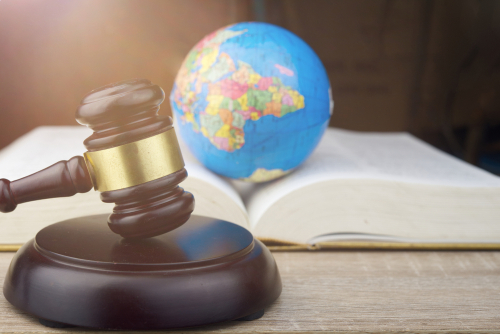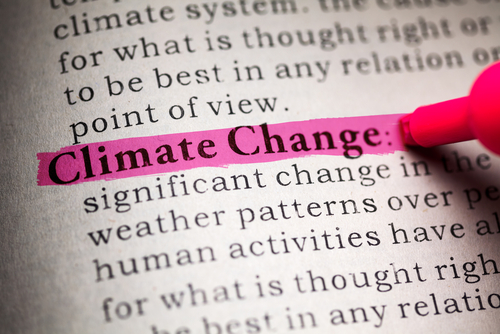7 ways lawyers can join the fight to curb climate change

Image from Shutterstock.com.
We feel the heat and breathe the smoke. We read about immense wildfires, vanishing ice, animal extinctions, drought, massive sea levels rising and threats to the food supply, and wonder what will be left of life on Earth in the coming years.
Intergovernmental Panel on Climate Change scientists tell us that if we don’t achieve cuts of 45% in global carbon emissions within 10 years, we won’t be able to limit temperature rise to 1.5 degrees Celsius, and we will substantially increase risk of major disruption to food and water supplies, fires, flooding, extreme heat and major weather events. Human and animal life hang in the balance.
There are essentially two paths that we lawyers can take in response to the crisis. We can mutter, “We’re screwed,” and go back to practicing law and living our high-carbon lifestyles. Alternatively, we can devote some of our time and resources to help ensure a livable future for our children and grandchildren.
Lawyers, and the bar as a whole, should join the campaign to save our planet from the ravages of rapid climate change. The chief strategy of the campaign is accelerating the drawdown of all sources of carbon emissions. The campaign must be pursued locally, nationally and internationally. The battle lines span legal, political, economic and cultural domains, and lawyers have much to contribute to all of them.
The decarbonization campaign is growing, but is still vastly under-resourced at all levels. To scale quickly, the campaign requires an army of lawyers and significant financial resources.
In my area of expertise, gasoline phaseout policy, a few dozen lawyers could make enormous contributions to slashing gasoline use, the single biggest source of carbon emissions. Other areas, among many, that desperately need legal and policy focus are natural gas drawdown, decarbonizing airplane fuels and land rehabilitation.
 Matthew Metz.
Matthew Metz.
Many people erroneously believe that nothing much good can happen on the climate front under the current administration. In fact, forward-thinking cities and states can slash fossil fuel consumption with smart policy, regardless of what the federal government does.
State and local changes can, in turn, shift national markets and pave the way for more radical changes at the national level when another administration is in power.
Lawyers reading this may be thinking, “Sure, I’d love to work on climate, but who’s going to pay me to do so?” At first, it’s likely that no one is going to pay you, because the organizations working on climate are grossly underfunded. That shouldn’t stop you. Even those who depend on a consistent paycheck to live can make time for climate work. It will likely be the most important pro bono project you’ll ever take on.
Over time, those with strong advocacy skills may be able to convince colleagues, friends and family to fund their climate work.
Or maybe you’re one of the lucky many who don’t need a paycheck. Many lawyers have already made enough money, but keep practicing law because they are at the top of their fields and enjoy what they do. To get to the top of their profession, these lawyers have usually had to demonstrate extraordinary skill in some combination of public speaking, writing, decision-making, management and networking, all skills essential to addressing the climate crisis.
Lawyers who can choose where to apply their skills should work to save the planet, rather than just handling another tort, contract or divorce matter. Why? Because they are desperately needed, and because they can have an outsized impact if they apply their skills to the climate campaign. Other lawyers will be right there to take the remunerative cases they leave behind.
I left behind a thriving and enjoyable plaintiff’s practice, and my clients found no trouble finding other representation. Giving up my source of income was both unsettling and liberating, and it took me years to feel fully comfortable with my decision. Now that I have left behind my practice and devoted myself to the world’s biggest problem, I feel a new burst of energy and excitement about my work.
Lawyers’ decision to work on climate is not merely an issue of personal preference—it is a duty. Greta Thunberg, the young Swedish climate activist says, “The bigger your carbon footprint, the bigger your moral duty. The bigger your platform, the bigger your responsibility.”
Most of us lawyers have left behind an enormous carbon footprint. We also have significant platforms and a responsibility to use them for good. Our forefathers and mothers volunteered to defend our country in World War II and at other critical junctures in our history. It is now our turn to defend our common home.
Here are some ways that lawyers can make a difference in the campaign against climate change:
1. Legal and policy research
Curtailing each source of fossil fuel emissions requires rigorous factual and legal analysis and creative policy making. For example, what powers do airports have to mandate biofuels to replace jet fuel? What city policies can promote electric vehicles and disincentivize gas-powered ones? How should city and county building codes be tweaked to keep natural gas out of new houses and to promote use of solar power in new construction? What incentive programs are necessary to develop electric airplane markets?
2. Litigation
Many legal violations pertaining to climate go unaddressed for lack of legal resources. For example, in my state of Washington, the vast majority of cities, counties and the state itself are out of compliance with the state’s vehicle electrification statute. There is an opportunity to bring lawsuits to force them into compliance, but such suits would require significant lawyer time and creativity. No such suit has yet been brought for lack of legal resources.
3. Legislative advocacy
Lawyers are needed to advocate for local and state government climate action. City, county and state governments make many decisions daily that bear on carbon emissions, usually with little or no citizen oversight. These issues range from governments unnecessarily purchasing gasoline-powered vehicles, permitting new gas stations, paying for city staff to fly unnecessarily to far-away meetings, allowing destruction of valuable greenspace or encouraging driving by expanding the road system.
Legislative advocacy takes many forms, from organizing groups of citizens within a legislative district, to speaking to legislators, to testifying in favor of a bill. More strong legislative advocates would make a big difference in passing state and local climate legislation. Many lawyers are skilled organizers, adept at rallying groups of people to a cause.
Citizen advocates need high quality research to guide their advocacy. Lawyers can help focus citizen advocacy on legally tenable strategies most likely to bear fruit.
4. Communications
Many lawyers are brilliant communicators, extraordinarily skilled at finding the narratives and language necessary to guide ordinary citizens to understand and act on unfamiliar and complex concepts. These same skills are needed to generate public support for the rapid and far-reaching changes necessary to cut carbon emissions on an accelerated timetable.
 Image from Shutterstock.com.
Image from Shutterstock.com.
5. Financially supporting climate work
Organizations working on climate are grossly underfunded. Less than 2% of all charitable giving goes toward combatting climate change.
Some lawyers may wish to help the climate movement, but don’t want to leave behind their work. These lawyers can still make a big difference by donating a percentage of their income or a sizable chunk of a contingency fee to organizations working to improve the climate, and by tapping their networks to do the same.
6. Reducing the bar and bench’s carbon footprint
Lawyers and judges can slash the carbon footprints of their workplaces and their families. They should avoid organizing conferences, meetings and hearings in locations to which people have to fly, and they should incentivize participation by video wherever possible. Lawyers who drive should buy an electric car for their next vehicle.
7. Working through the bar
Bar associations must step up as well. Decarbonization must become a focus of the bar. Climate working groups should be formed, and legal publications should regularly report on how lawyers are tackling climate issues.
The preamble to the ABA Model Rules of Professional Conduct states, “Lawyers play a vital role in the preservation of society.” Read the 2019 IPCC summary report: It is no overstatement to say that we live in a time when the future of our society, and the natural world, are in grave peril. We lawyers must meet this challenge with energy, determination, skill and solidarity with all those who will be affected by climate change.
Lawyers are known for not going down without a fight, even when the odds are stacked against us. In the near future, your children or grandchildren may look you right in the eye and ask you, “What did you do about climate change?” That question must be answered now with action.
Matthew Metz is co-executive director of Coltura, a nonprofit working to phase out the use of gasoline. He has been a lawyer since 1991. He gradually left his civil litigation practice beginning in 2014 to focus on climate issues. He can be reached at [email protected].
ABAJournal.com is accepting queries for original, thoughtful, nonpromotional articles and commentary by unpaid contributors to run in the Your Voice section. Details and submission guidelines are posted at “Your Submissions, Your Voice.”
Your Voice submissions

The ABA Journal wants to host and facilitate conversations among lawyers about their profession. We are now accepting thoughtful, non-promotional articles and commentary by unpaid contributors.

